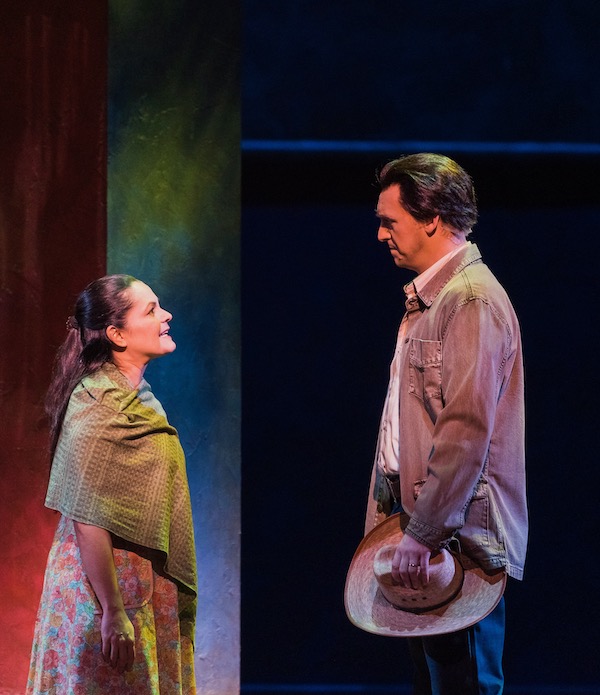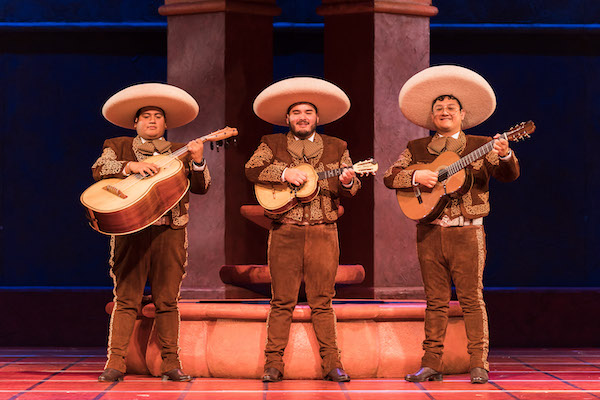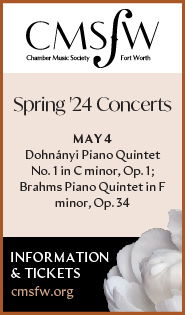“Milagro” brings holiday warmth in timely Houston Grand Opera revival

Houston Grand Opera has commissioned a handful of holiday-themed works over the past decade, including adaptations of Charles Dickens’ A Christmas Carol and Hollywood’s It’s a Wonderful Life. “Time will tell which of them may find an audience,” HGO artistic director Patrick Summers writes in the program book for another in the series: Javier Martínez’s El Milagro del Recuerdo (The Miracle of Remembering).
HGO cast a vote in favor of Milagro’s survival on Friday, when the company made the mariachi-style opera the first of its holiday commissions to get a revival. Almost all of the full-throated cast from the 2019 premiere returned to Wortham Theater Center, and the tuneful work’s emotional impact held up, undimmed on second hearing.
Milagro is the third installment in the mariachi-opera genre HGO launched in 2010 with Cruzar la Cara de la Luna by Martínez’s father, Pepe Martínez, and librettist-director Leonard Foglia—who also collaborated on Milagro.
Cruzar looks at a family that is divided across the U.S.-Mexico border. The one-act Milagro is a prequel, taking Cruzar’s central couple—Renata and Laurentino—back to the Mexican village where they grew up.
It’s set at Christmastime of 1962, when Mexican men could legally travel back and forth to the United States to earn money through a federal guest-worker program.
Milagro begins as villagers rehearse the annual Christmas pageant. For all the excitement of the season, Renata and her friend Lupita miss their husbands, who are off at work north of the border. When Laurentino and Chucho, Lupita’s husband, come home for Christmas, the joy of the reunion quickly gives way to quandaries. Should Laurentino stay home, as Renata resolutely wants, rather than go back and work to provide for his family? Should Chucho, whose U.S. boss has offered him a job, take his family away to stay?
Martínez’s score tells the story through a series of mariachi-flavored songs whose melodies welcome the richness of opera-style voices. Though the tune-centric songs are in some ways simple—like the arias in bel canto opera—they still convey feeling and spirit.
Renata’s first solo puts across her yearning to have Laurentino home and her family reunited. The lullaby Laurentino sings to their son, Rafael, exudes tenderness. Josefina, Renata’s mother, sings a robust number telling Renata that, just because she’s determined that Laurentino should stay home, that doesn’t mean she’s right. A flashy duet lets Chucho and Lupita imagine themselves as Americans. Catchy, festive tunes animate the Christmas pageant.
The newcomer among the principals Friday was bass-baritone Federico De Michelis, who treated Laurentino’s music to the fullness and heft he brought the role of the priest Balthazar in HGO’s 2020 production of Donizetti’s La Favorite.
De Michelis’ hearty, rich tones lent Laurentino a dignity that made his desire to support his family—even if it meant working far away—as compelling as Renata’s longing to have him home. Yet his voice softened as needed to embrace Laurentino’s lullaby to his son.
As Renata, mezzo-soprano Cecilia Duarte returned to a role she played not only in Milagro’s world premiere but in Cruzar as well (in addition to subsequent performances of both).
In Renata’s first solo, Duarte’s robust singing captured not only the intensity of Renata’s desire to have her husband with her, but a tinge of resentment about his absence. But her singing gained warmer, gentler tones as Renata began to feel her situation’s emotional cross-currents.
Mariachi singers Vanessa Alonzo and Miguel de Aranda, as Lupita and Chucho, showed that their earthy voices could bring Martínez’s tunes to life as readily as the opera singers could. The pair also threw themselves into the American number, complete with Elvis-style swiveling hips. When Josefina told her daughter Renata not to be so sure of herself, mezzo-soprano Claudia Chapa’s lusty singing put across the song’s message while still coming across as sympathetic.

As Aba, Chucho’s father, baritone Héctor Vásquez reveled in the devil’s snarling in the Christmas pageant. But he made a complete turnaround to capture Aba’s wisftulness as the aging man tried to summon memories of the parents who died when he was small.
Soprano Vanessa Becerra was gracious in both voice and demeanor as La Mujer, a mysterious woman who appears at times to help the characters get in touch with their emotions. Tenor Rafael Moras, playing village priest Father Matias, sang with an unbridled enthusiasm and vibrancy that redoubled the Christmas pageant’s exuberance. And the three guitarist-singers of Trio Chapultepec— Vincent Pequeño, William Carlton Galvez and Israel Alcala—enhanced the mariachi flavor adroitly, stepping to the fore at some times, taking a background role at others.
The HGO Orchestra did much the same: Led by Benjamin Manis, it often played a quiet supporting role, but it periodically magnified the music’s spirit by letting a trumpet descant or violin tune sail out. Revival director Beth Krynicki brought out the sincerity and effectiveness of Foglia’s staging, which were abetted by Neil Patel’s simple, shape-shifting sets.
With so much going for it, maybe Milagro will “find an audience,” to quote Summers’ note.
But his essay makes a curious omission. He says other performing genres have holiday works—Messiah, Nutcracker, A Christmas Carol—“but not opera.” What about Gian Carlo Menotti’s Amahl and the Night Visitors?
El Milagro del Recuerdo runs through December 18. houstongrandopera.org


